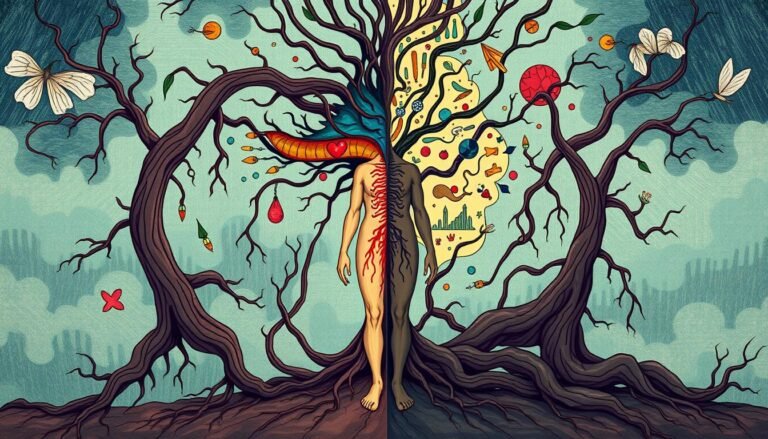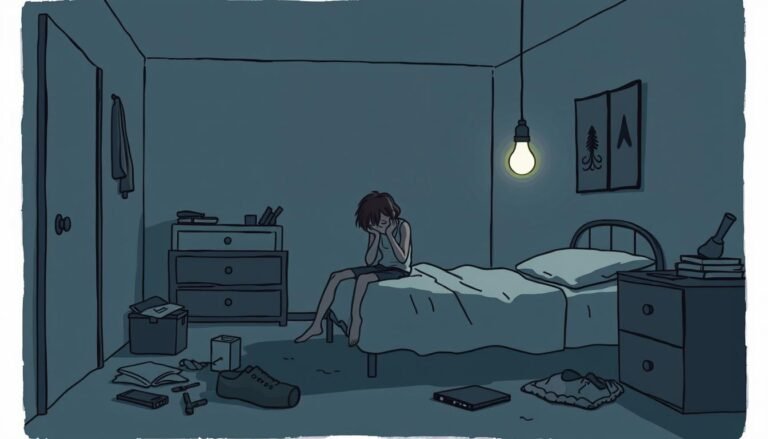Family Therapy: Healing Relationships Together
Ever thought about how families can fix broken bonds and tackle big challenges? Family therapy might be what you need. It’s a powerful way to heal relationships and has helped many families through tough times.
Family therapy is a special kind of group therapy. It aims to improve how family members relate to each other. It helps them share feelings, understand each other better, and break down barriers.
Studies show that 65% of families facing conflicts find relief through family therapy. It’s also shown to improve family connections by 78%. This proves its success in fixing relationship issues and helping with emotional healing.
Family therapy can be done in person or online. It helps each family member understand their role and build empathy. It creates a supportive atmosphere, tackling issues like life changes and mental health problems.
Exploring family therapy can show you how it can help your family overcome challenges. Are you ready to start building a stronger, more united family?
Understanding Family Therapy: A Path to Healing
Family therapy is a powerful way to improve family relationships and mental health. It helps strengthen bonds, solve conflicts, and teach better communication skills.
Defining Family Therapy and Its Purpose
Family therapy is a special kind of mental health treatment. It works with families to help them grow and change. The goal is to make the home environment better, solve problems, and build stronger family ties.
The Role of a Family Therapist
A family therapist is a trained professional who helps families face challenges. They offer guidance, support, and tools to improve communication and solve problems. These experts often focus on marriage counseling and mental health issues in families.
Common Issues Addressed in Family Therapy
Family therapy tackles many issues, including:
- Relationship conflicts
- Adjusting to life changes
- Coping with illness or loss
- Childhood behavioral problems
- Mental health conditions
| Therapy Type | Focus Area |
|---|---|
| Structural Family Therapy | Improving family relationships |
| Cognitive-Behavioral Therapy | Changing negative thought patterns |
| Systemic Family Therapy | Considering external factors in family dynamics |
By tackling these issues, family therapy creates a supportive environment. It helps each family member grow and thrive. It gives families the tools to overcome challenges and strengthen their bonds.
Types of Family Therapy Approaches
Family therapy has many ways to help families. These methods aim to improve how families work together and solve problems. Let’s look at some common types of family therapy.
Functional Family Therapy (FFT)
FFT helps families with kids who have behavioral problems. It works on making family relationships and parenting better. This approach teaches families how to talk better and solve problems together.
Strategic Family Therapy
This short-term therapy aims to make positive changes in family structure and behavior. It’s great for tackling specific issues like drug use. Strategic therapy goes through several stages:
- Social stage
- Problem stage
- Interactional stage
- Goal-setting stage
- Task-setting stage
Structural Family Therapy
Structural Family Therapy looks at family relationships, boundaries, and hierarchy. It helps find and change family patterns that cause problems. This method is good for families with communication issues.
Systemic Family Therapy
Systemic therapy looks at family issues in different contexts, like culture and economy. It helps families see how outside factors affect their relationships and how to solve conflicts.
| Therapy Type | Focus | Benefits |
|---|---|---|
| Functional Family Therapy | Behavioral issues | Improved parenting skills |
| Strategic Family Therapy | Specific problems | Positive structural changes |
| Structural Family Therapy | Family dynamics | Better communication |
| Systemic Family Therapy | External influences | Increased understanding |
These methods offer different ways to help families. They focus on improving family relationships and solving conflicts. Therapists often mix different approaches to meet a family’s unique needs.
The Family Therapy Process: What to Expect
https://www.youtube.com/watch?v=ohTm_YQ1zx4
Family therapy is a journey of healing and growth. It starts with a therapist creating a safe space for open dialogue. This space lets family members share their feelings and views freely.
The goal is to tackle relationship issues and improve mental health together. This way, the family can grow stronger.
During sessions, the therapist looks into family dynamics and how they communicate. They help find the family’s strengths and areas to work on. This is key for better parenting and solving family conflicts.
A big part of family therapy is learning about mental health. Therapists teach about mental health conditions, their causes, and treatments. This knowledge helps families support each other better.
- 70-80% of mental health conditions show significant improvement with family therapy
- Therapists focus on interactions rather than individual “problems”
- Sessions typically involve exploring communication patterns and family dynamics
- Strength-based approaches are used to utilize family resources
Family therapists are highly trained. They have advanced degrees and complete extensive clinical fellowships. This ensures families get care that fits their unique needs.
Remember, family therapy is a team effort. It’s about working together to build stronger relationships and a healthier family environment. With patience and commitment, families can overcome challenges and thrive.
Benefits of Family Therapy
Family therapy has many benefits for improving family life and emotional healing. Studies show it works well for many issues and boosts overall well-being.
Improved Communication Skills
One key advantage of family therapy is better communication. Over 80% of families see their talks improve and conflicts lessen after therapy. This leads to more honest and open family discussions, making the family environment healthier.
Strengthened Family Bonds
Family therapy also makes family ties stronger. A study in the Journal of Marital and Family Therapy found 90% of people felt their family bonds improved after therapy. This makes the family more supportive and caring.
Enhanced Problem-Solving Abilities
Therapy teaches families to solve problems better. The American Association for Marriage and Family Therapy says 97% of clients found the help they needed in family therapy. This skill helps families deal with challenges more easily, reducing stress and fights.
Increased Empathy and Understanding
Family therapy also boosts empathy and understanding. Research shows therapy can cut the risk of future mental health issues in kids by 55%. This empathy creates a more caring and supportive family atmosphere.
| Benefit | Percentage of Improvement |
|---|---|
| Improved Communication | 80% |
| Enhanced Family Relationships | 90% |
| Reduced Mental Health Risks in Children | 55% |
| Overall Effectiveness | 97% |
Innovative Techniques in Family Therapy
Family therapy has grown to include new techniques for healing and growth. These methods help improve Communication Skills, solve Conflicts, and support Mental Health in families.
Genograms are a popular tool. They show family relationships over three generations. This helps families understand their dynamics better. Family sculpting is another method. It involves members physically showing their roles and relationships.
Circular questioning helps families see problems from different angles. This builds empathy and understanding. Teaching Communication Skills is key. It includes active listening and expressing feelings without blame.
| Technique | Purpose | Benefits |
|---|---|---|
| Genogram Construction | Visualize family relationships | Identify patterns across generations |
| Family Sculpting | Represent family dynamics physically | Gain insights into roles and distances |
| Circular Questioning | Explore multiple perspectives | Enhance empathy and understanding |
| Communication Skills Training | Improve family interactions | Reduce conflicts and misunderstandings |
Narrative therapy is becoming more popular. It encourages families to see their stories in a positive light. This helps break patterns of dysfunction passed down through generations.
These new techniques aim to make family bonds stronger. They help families solve problems better and communicate more healthily. By focusing on these areas, family therapy supports Mental Health and builds resilience in families.
Conclusion
Family therapy is a beacon of hope for those facing relationship issues. It offers a way to mend family bonds. Sessions last 60 to 90 minutes and are customized for each family’s needs.
Licensed therapists, with their extensive training, lead families on a journey of better communication and conflict resolution. This journey is crucial for improving family relationships.
The therapy process has five stages: engagement, assessment, goal setting, intervention, and follow-up. Families learn important skills like active listening and assertiveness. They practice these skills through role-playing and problem-solving exercises.
This structured approach helps families overcome many challenges, from infidelity to parent-teen conflicts. It promotes a healthier family dynamic.
Research shows family therapy’s significant impact on family functioning. It improves parental supervision, strengthens family bonds, and promotes consistent discipline. This helps protect against issues like delinquency and substance abuse.
For families ready to start this healing journey, seeking recommendations is key. It helps find the right therapist. This can lead to a stronger, more harmonious family unit.
Source Links
- 10 Family Therapy Activities For Building Relationships – Healing Collective Therapy
- Healing Together: The Role of Family Therapy in Chronic Illness – Third Wave Psychotherapy
- Families post‐release: Barriers and pathways to family therapy
- The Art of Mental Healing: Family Therapy Insights
- Top Family Therapy Techniques: Improving Family Dynamics
- How Family Therapy Works: Understanding Its Role and Benefits
- Family Therapy: What It Is, Techniques & Types
- Types of Family Therapy Approaches
- What to Expect from Family Therapy
- Family Therapy: What to Know About Therapy, Types, Benefits
- The Goals and Benefits of Family Therapy – Comprehensive MedPsych Systems
- Benefits of Family Counseling and How It Works
- 7 Family Therapy Techniques to Help Promote Healthy Relationships
- Family Systems Theory in Counseling: Key Techniques
- How Family Therapy Can Strengthen Relationships | FSC
- What are the 5 stages of family therapy? — Moriel Mental Health ||| Riverside California
- Family Therapy Literature Review








